Spit is a card game of the shedding family for two players. It is a form of competitive patience. The game is played until all of a player's cards are gone. It has a close variant known as Speed. Spit appears to have originated in the UK in the 1980s.
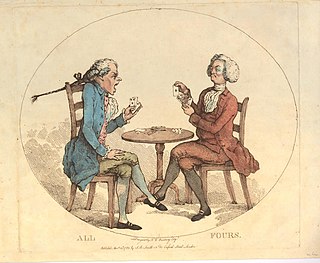
All Fours is a traditional English card game, once popular in pubs and taverns as well as among the gentry, that flourished as a gambling game until the end of the 19th century. It is a trick-taking card game that was originally designed for two players, but developed variants for more players. According to Charles Cotton, the game originated in Kent, but spread to the whole of England and eventually abroad. It is the eponymous and earliest recorded game of a family that flourished most in 19th century North America and whose progeny include Pitch, Pedro and Cinch, games that even competed with Poker and Euchre. Nowadays the original game is especially popular in Trinidad and Tobago, but regional variants have also survived in England. The game's "great mark of distinction" is that it gave the name 'Jack' to the card previously known as the Knave.

Euchre or eucre is a trick-taking card game commonly played in Australia, Canada, Great Britain, New Zealand, and the Midwestern United States. It is played with a deck of 24, 28, or 32 standard playing cards. There are normally four players, two on each team, although there are variations for two to nine players.

Slapjack, also known as Slaps, is a card game of the matching family, generally played among children. It can often be a child's first introduction to playing cards. The game is a cross between Beggar-My-Neighbour and Egyptian Ratscrew and is also sometimes known as Heart Attack. It is also related to the simpler 'slap' card games often called Snap.
Marjapussi is a traditional Finnish trick taking game for 4 players playing in 2 partnerships and is one of the Mariage family, its key feature being that the trump suit is determined in the middle of the play by declaring a marriage. There are variants of Marjapussi for two and three players.

Mau-Mau is a card game for two to five players that is popular in Germany, Austria, South Tyrol, the United States, Brazil, Greece, Czech Republic, Slovakia and the Netherlands. Mau-Mau is a member of the larger Crazy Eights or shedding family, to which the proprietary card game Uno belongs. However, Mau-Mau is played with standard French or German-suited playing cards.

Snap is a card game in which players deal cards and react quickly to spot pairs of cards of the same rank. Cards are either dealt into separate piles around the table, one per player, or into a single shared pile. The game may be a simplified version of the older Snip Snap Snorem.
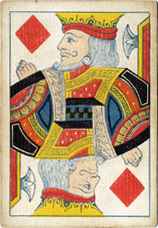
Ranter Go Round is a primitive, traditional, English gambling game and children's game using playing cards that also nowadays goes under the name of Chase the Ace.
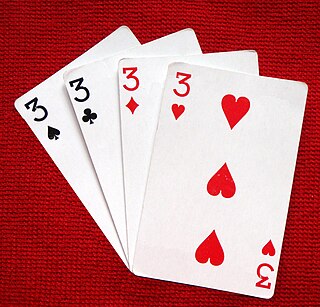
Put, occasionally Putt, is an English tavern game first recorded in the 16th century and later castigated by 17th century moralists as one of ill repute. It belongs to a very ancient family of trick-taking card games and bears close similarities a group known as Truc, Trut,Truque, also Tru, and the South American game Truco. Its more elaborate cousin is the Catelan and Spanish game of Truc, which is still much played in many parts of Southern France and Spain.
Ristikontra or Ristiklappi, sometimes translated as Cross-clap, is a Finnish point-trick game for four players using a standard 52-card pack. Card suits do not play a role in this game, and there is no ranking order. A trick is won by the last player to play a card of the same rank as the card led.
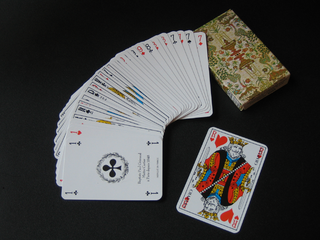
Brusquembille or Briscambille is an historical, French, 3-card trick-and-draw game for two to five players using a 32-card piquet pack. The game has variable trumps. Side-payments are made for keeping or winning aces and tens.
Elfern or Elfmandeln, is a very old, German and Austrian 6-card, no-trump, trick-and-draw game for two players using a 32-card, French-suited Piquet pack or German-suited Skat pack. The object is to win the majority of the 20 honours: the Ace, King, Queen, Jack and Ten in a Piquet pack or the Ace, King, Ober, Unter and Ten in a Skat pack. Elfern is at least 250 years old and a possible ancestor to the Marriage family of card games, yet it is still played by German children.

Egyptian Ratscrew (ERS) or Slap is a modern American card game of the matching family and popular with children. The game is similar to the 19th-century British card game beggar-my-neighbour, with the added concept of "slapping" cards when certain combinations are played, similar to and perhaps borrowed from Slapjack.

Bauerntarock also called Brixentaler Bauerntarock or Brixental Tarock, is a point-trick card game played in the Brixental, Austria. It may have originated in the 19th century either as an adaptation of 54-card Tapp Tarock onto the cheaper and smaller 36-card German pack. Another possibility is that it was adapted from the 78-card Grosstarock or Taroc l'Hombre game as the ratio of trumps to non-trumps is almost the same. It uses the Skat Schedule found in popular regional games such as Jass and Schafkopf. It is closely related to Bavarian Tarock, German Tarok, Württemberg Tarock and especially Dobbm. Like Bavarian Tarock and Tapp, Brixental Bauerntarock and Dobbm do not belong to the true tarot games, but have adopted rules from Tapp Tarock. The most fundamental difference between these games and true tarot games is in the use of German or French decks instead of true Tarot playing cards.
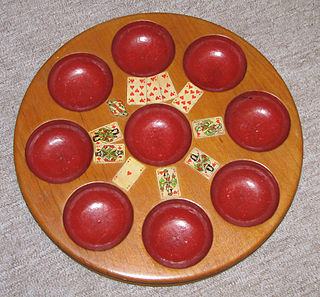
Poch, Pochen or Pochspiel is a very old card game that is considered one of the forerunners of poker, a game that developed in America in the 19th century. An etymological relationship between the game names is also assumed. Games related to Poch are the French Glic and Nain Jaune and the English Pope Joan. Other forerunners of poker and possible relatives of the game are the English game, Brag, from the 16th century and the French Brelan and Belle, Flux et Trente-et-Un. Poch is recorded as early as 1441 in Strasbourg. In north Germany it was called by the Low German name of Puchen or Puchspill, and the board was a Puchbrett.

Newmarket is an English card game of the matching type for any number of players. It is a domestic gambling game, involving more chance than skill, and emerged in the 1880s as an improvement of the older game of Pope Joan. It became known in America as Stops or Boodle before developing into Michigan. In 1981, Newmarket was still the sixth most popular card game in Britain.

Slobberhannes is a trick-taking, American card game, possibly of German origin, for four players, in which the aim is to avoid taking the first and last tricks and the queen of clubs. Hoyle's describes it as "really quite an excellent game for the family circle" that "can be played with equal enjoyment either for counters or for small stakes..
SnipSnap is an app that will let you receive free coupons.
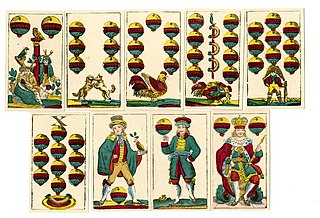
Kauflabet or Kauf-Labet is an historical German trick-taking card game for three to five players that was popular within women's circles.

Hoc Mazarin, also just Hoc, is an historical French gambling game of the Stops family for two or three players. The game was popular at the court of Versailles in the 17th century and was named after Cardinal Mazarin, chief minister to the King of France.















